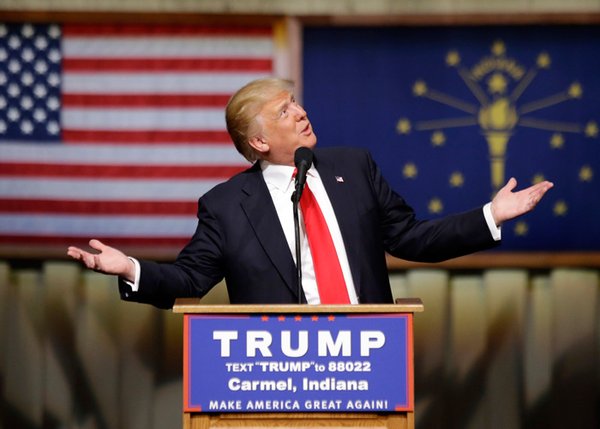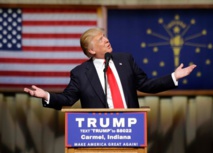As Republicans endeavor to reshape their White House candidate's image as someone with the temperament and experience to lead, the "Trump Museum" takes a less flattering look at the presumptive nominee's past.
"We wanted to take a step back and look at the decades" of Trump's life, said Kevin McAlister, a spokesman for the project which is currently open only to journalists, but will open to the public by appointment later this week.
On display are a collection of articles and photographs dating back to the 1980s and dozens of Trump-branded items.
Course materials from Trump University were in prominent display -- a reminder that Trump is being sued by former students of the real-estate training venture who say they did not get their money's worth. Trump retorts that many students gave the program positive evaluations.
The "Trump Museum" is backed by a Democratic Super PAC, or campaign finance group, named American Bridge 21st Century and largely funded by Soros, a prominent philanthropist and supporter of liberal politics.
- 'Hypocrisy' -
As part of the normal course of election campaigning, the Super PAC spent the last year gathering opposition research on Trump, McAlister said.
Located on the sixth floor of a mostly-abandoned former printing house near the convention, the pop-up museum offered no real surprises.
Its aim, said McAlister, is to highlight contradictions between Trump's rhetoric and his actions, and to draw attention to the derogatory remarks he has made -- about women and immigrants in particular.
The one-room exhibition includes framed photos from Trump's past, such as a press event with 1996's Miss Universe Alicia Machado. In the photo, Machado is exercising for the cameras as Trump -- who owned the beauty pageant -- looks on.
In a television interview earlier this year, Machado said she felt bullied by Trump. "For sure, he's not a good person," she said.
Featured Trump merchandise included T-shirts, a board game, and a suit made in Mexico -- intended to highlight the candidate's inconsistency in denouncing the off-shoring of American manufacturing.
"Reeks of hypocrisy," McAlister charged.
But the museum was not without at least one gaffe. In one display case lay a folded vest -- purple, with shiny decoration. It was worn by valets at Trump's Taj Mahal casino in Atlantic City, New Jersey.
The vest was intended as yet another example of off-shoring, but the label inside said it was made by a company in Chicago.
American Bridge received much of its funding this year from unions and wealthy progressive supporters.
Soros donated $1 million according to the group's latest filings with the Federal Elections Commission. Tech entrepreneurs Phillip Ragon and Paul Egerman donated $250,000 and $300,000 respectively.
The unions AFL-CIO and the American Federation of Teachers have also contributed.
--------------------------------------------------------------------------------------------------------------------
"We wanted to take a step back and look at the decades" of Trump's life, said Kevin McAlister, a spokesman for the project which is currently open only to journalists, but will open to the public by appointment later this week.
On display are a collection of articles and photographs dating back to the 1980s and dozens of Trump-branded items.
Course materials from Trump University were in prominent display -- a reminder that Trump is being sued by former students of the real-estate training venture who say they did not get their money's worth. Trump retorts that many students gave the program positive evaluations.
The "Trump Museum" is backed by a Democratic Super PAC, or campaign finance group, named American Bridge 21st Century and largely funded by Soros, a prominent philanthropist and supporter of liberal politics.
- 'Hypocrisy' -
As part of the normal course of election campaigning, the Super PAC spent the last year gathering opposition research on Trump, McAlister said.
Located on the sixth floor of a mostly-abandoned former printing house near the convention, the pop-up museum offered no real surprises.
Its aim, said McAlister, is to highlight contradictions between Trump's rhetoric and his actions, and to draw attention to the derogatory remarks he has made -- about women and immigrants in particular.
The one-room exhibition includes framed photos from Trump's past, such as a press event with 1996's Miss Universe Alicia Machado. In the photo, Machado is exercising for the cameras as Trump -- who owned the beauty pageant -- looks on.
In a television interview earlier this year, Machado said she felt bullied by Trump. "For sure, he's not a good person," she said.
Featured Trump merchandise included T-shirts, a board game, and a suit made in Mexico -- intended to highlight the candidate's inconsistency in denouncing the off-shoring of American manufacturing.
"Reeks of hypocrisy," McAlister charged.
But the museum was not without at least one gaffe. In one display case lay a folded vest -- purple, with shiny decoration. It was worn by valets at Trump's Taj Mahal casino in Atlantic City, New Jersey.
The vest was intended as yet another example of off-shoring, but the label inside said it was made by a company in Chicago.
American Bridge received much of its funding this year from unions and wealthy progressive supporters.
Soros donated $1 million according to the group's latest filings with the Federal Elections Commission. Tech entrepreneurs Phillip Ragon and Paul Egerman donated $250,000 and $300,000 respectively.
The unions AFL-CIO and the American Federation of Teachers have also contributed.
--------------------------------------------------------------------------------------------------------------------









 Home
Home Politics
Politics











